 Petzlover
Petzlover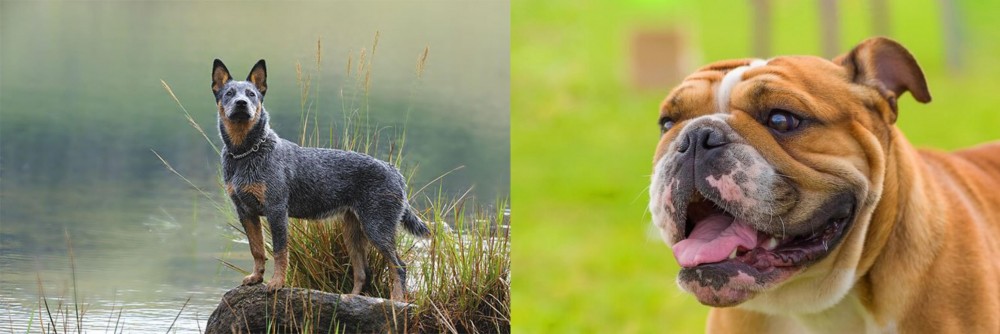 Blue Healer is originated from Australia but Miniature English Bulldog is originated from United Kingdom. Blue Healer may grow 16 cm / 7 inches higher than Miniature English Bulldog. Both Blue Healer and Miniature English Bulldog are having almost same weight. Blue Healer may live 3 years more than Miniature English Bulldog. Blue Healer may have more litter size than Miniature English Bulldog. Blue Healer requires Low Maintenance. But Miniature English Bulldog requires Moderate Maintenance
Blue Healer is originated from Australia but Miniature English Bulldog is originated from United Kingdom. Blue Healer may grow 16 cm / 7 inches higher than Miniature English Bulldog. Both Blue Healer and Miniature English Bulldog are having almost same weight. Blue Healer may live 3 years more than Miniature English Bulldog. Blue Healer may have more litter size than Miniature English Bulldog. Blue Healer requires Low Maintenance. But Miniature English Bulldog requires Moderate Maintenance
 It was in 1802 that George Hall arrived in New South Wales, establishing 2 cattle stations. He had a problem – getting his thousands of cattle to the Sydney markets. He began looking at the prospect of a droving dog and imported a number of dogs of which a blue mottled dog emerged.
It was in 1802 that George Hall arrived in New South Wales, establishing 2 cattle stations. He had a problem – getting his thousands of cattle to the Sydney markets. He began looking at the prospect of a droving dog and imported a number of dogs of which a blue mottled dog emerged.
The dogs were crossed with dingoes and by 1840 the Halls Heelers were used by the Halls. However with the death of one of the Halls, their cattle stations went to action and the dogs, the Halls Heelers became available.
The dogs attracted attention, and the term ‘Australian Cattle Dog’ was adopted. The name referred to those dogs coming from Thomas Hall's ‘Heelers’. There have been many arguments about the origin of the breed, but the red or blue offspring known as Hall's Heelers were proven cattle drovers, and with further breeding experiments which included the Australian Kelpie, dingoes and the Dalmation, by 1893, the tough, robust working breed known as the Blue Heeler or the Australian Cattle Dog came about.
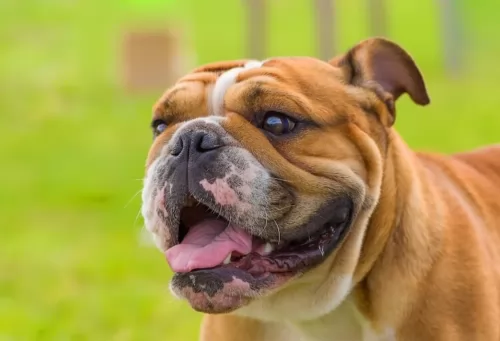 The Miniature Bulldog is such a cute little dog, hailing from England in the 18th and early 19th centuries. The exact development of the dog is unclear and it seems as though the breeders weren’t working together and were working in two different directions.
The Miniature Bulldog is such a cute little dog, hailing from England in the 18th and early 19th centuries. The exact development of the dog is unclear and it seems as though the breeders weren’t working together and were working in two different directions.
There is a lot of debate about the very name ‘miniature’ too because some breeders gave this name to a hybrid mix of a Pug and Bulldog. It seems some breeds were created by crossing English Bulldogs with French Bulldogs to decrease their size. Certainly the origins for the Miniature Bulldog are unknown and there isn’t one particular breeder who can be credited with developing the breed.
Because the Miniature Bulldog is a hybrid breed, it isn’t accepted by the AKC, but it is accepted by the American Canine Hybrid Club as well other registries.
 Blue Heelers are medium-sized, sturdy, compact dogs who are somewhat longer than tall. The female Blue Heeler measures roughly 43–48cm at the withers, while the male measures about 46–51cm. If your Blue Heeler is in tip top condition, he’ll weigh about 15 to 22 kilograms. They are muscular with pointed, erect ears, dark eyes and long tails which are mostly hanging downwards. Their dense coats are blue- or red speckled and sometimes with tan markings.
Blue Heelers are medium-sized, sturdy, compact dogs who are somewhat longer than tall. The female Blue Heeler measures roughly 43–48cm at the withers, while the male measures about 46–51cm. If your Blue Heeler is in tip top condition, he’ll weigh about 15 to 22 kilograms. They are muscular with pointed, erect ears, dark eyes and long tails which are mostly hanging downwards. Their dense coats are blue- or red speckled and sometimes with tan markings.
The Blue Heeler is a ball of energy and he is clever too. You won’t find him sitting around for too long, and if there is sign of a walk or a ball game, he’s in! He is an independent dog, and although he makes a wonderful family pet, he tends to attach himself to that one special person in his life. He is a natural watchdog and protector of his human family.
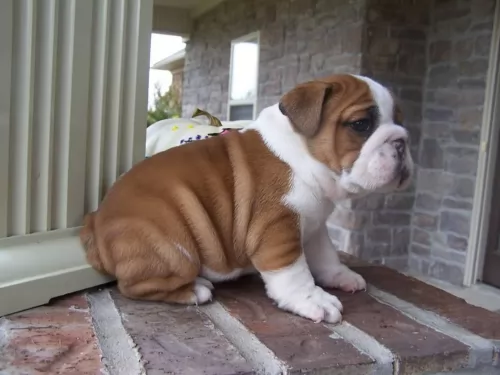 Because the Miniature Bulldog is a cross between two purebred breeds – the Pug and the English Bulldog. You can expect different looks and characteristics from each breed.
Because the Miniature Bulldog is a cross between two purebred breeds – the Pug and the English Bulldog. You can expect different looks and characteristics from each breed.
Your mini Bulldog is a small breed dog standing between 25 and 35cm male and female and weighing between 11 and 18kg. The average litter size for these dogs is about 4 puppies.
The Miniature Bulldog has a short coat which sheds moderately and that comes in different colors such as tan and white, brindle, with black and grey also having a show in.
The Miniature Bulldog is a social, friendly breed who is able to get on well with all members of the family, including children and pets in the home. His very stature makes it that he isn’t the most active of dogs, but nonetheless you still want to exercise him and take him for walks to avoid obesity.
As with all dogs, training and socialization are imperative because this is a strong-willed dog who wants to go his own way.
 Training and socializing of your Blue Heeler will ensure that your dog does what you want him to. The Blue Heeler is an intelligent, responsive dog and training can benefit him, turning him into an outstanding family pet, good with children and other pets in the home.
Training and socializing of your Blue Heeler will ensure that your dog does what you want him to. The Blue Heeler is an intelligent, responsive dog and training can benefit him, turning him into an outstanding family pet, good with children and other pets in the home.
He is a playful, affectionate pet who doesn’t take easily to strangers, and this is what makes him such an excellent guard dog.
Your Blue Heeler is not an apartment dog as he requires a lot of exercise, and cooping him indoors for too long with nothing to do can lead to destructive behavior.
Head-strong, independent and robust, your Blue Heeler will need a firm owner who is boss. Add to the firm owner a lot of love and care, and you’ll have a devoted friend.
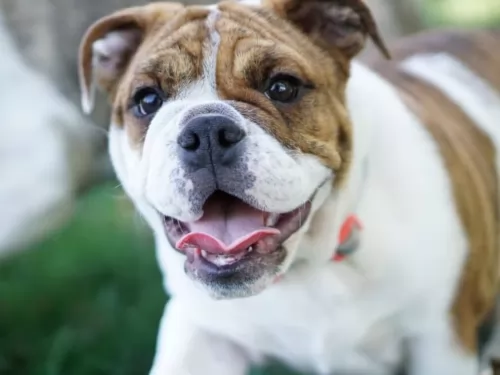 You’ll love having one of these entertaining, friendly dogs by your side. He is docile, social, fun and a bit stubborn too but he is able to get on well with children in the home as well as with other pets.
You’ll love having one of these entertaining, friendly dogs by your side. He is docile, social, fun and a bit stubborn too but he is able to get on well with children in the home as well as with other pets.
He can adapt to life in the city as well as in the countryside as he doesn’t require too much exercise.
Take special care of him and he’ll make you a splendid family pet.
 Australian cattle dogs are healthy and can live up to 15 years of age, but even so there are some genetic conditions that you will need to be aware of following
Australian cattle dogs are healthy and can live up to 15 years of age, but even so there are some genetic conditions that you will need to be aware of following
Eye issues which includes progressive retinal atrophy – this disease is an inherited disease of the retina of the eye where the rod cells are destined to die. Fortunately it is not painful for the dog. There are different types of inherited retinal degenerative diseases in dogs but going into detail with them is beyond the scope of this article. For more information you can chat to your vet.
Recessive piebald elleles - the Blue Heeler has recessive piebald alleles which can produce white in the skin and coat and which is linked to congenital hereditary deafness.
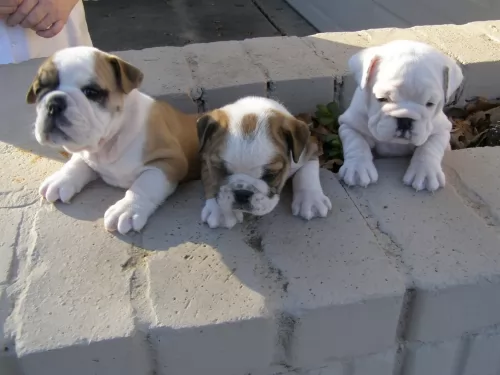 Unfortunately the origins of the Miniature English Bulldog are not 100% clear and therefore other important information isn't readily available.
Unfortunately the origins of the Miniature English Bulldog are not 100% clear and therefore other important information isn't readily available.
These dogs are always prone to breathing and nasal abnormalities because of the shape of their faces as well as being prone to heart deficiencies. Snoring, grunting and quite a bit of panting is part and parcel of the mini English Bulldog.
They’re also prone to overheating, cherry eye and hip dysplasia. It is most unlikely that your Miniature English Bulldog is going to get any of these illnesses and the good news is that he can live to be up to 12 years of age.
 Remember that your Blue Heeler was once a full time cattle dog where he used to become totally and utterly exhausted from herding cattle. This is what he loved – the activity. If you have a Blue Heeler, you will need to provide him with plenty of exercise.
Remember that your Blue Heeler was once a full time cattle dog where he used to become totally and utterly exhausted from herding cattle. This is what he loved – the activity. If you have a Blue Heeler, you will need to provide him with plenty of exercise.
If you live on a farm, your Blue Heeler will be in his element because he can run, walk and swim to his heart’s content. If you keep your Blue Heeler in your back garden, you will need to provide him with ball games, rope games, long walks, running on a leash as you cycle and other activities.
Your Blue Heeler has a short, weather-resistant double coat. He’s not a heavy shedder, but he will have his share of seasonal shedding, so it’s a good idea to get into the habit of brushing him at least twice a week. This will get rid of all those loose hairs and keep his skin healthy by getting the blood flowing and distributing his natural oils.
Giving the best dog food for your Blue Heeler will come from either your home made food or a top quality commercially manufactured dog food. He is such a high energy dog, that your veterinarian can advise you on a dog food specially designed for high energy breeds.
These foods are well balanced and are enriched with amino acids and vitamins, promoting healthy bones and joints. Remember to include some raw meat into your dog’s diet and to ensure a constant source of cool, fresh water.
Ensure your Blue Heeler’s ongoing health by paying attention to ears, nails and teeth.
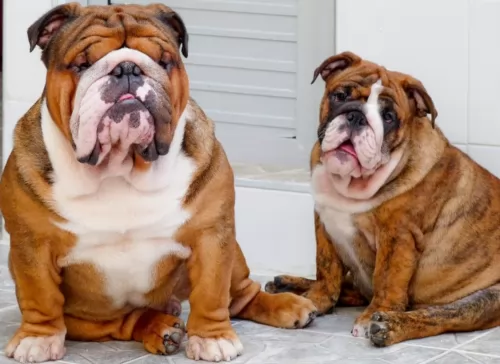 Feeding the Miniature English Bulldog is hugely important. It is imperative that he doesn't become obese. Buy the best dog food there is and see to it that he also gets some home-made food. Chop up boiled chicken, brown rice ad vegetables for your pet and mix occasionally into his dry kibble.
Feeding the Miniature English Bulldog is hugely important. It is imperative that he doesn't become obese. Buy the best dog food there is and see to it that he also gets some home-made food. Chop up boiled chicken, brown rice ad vegetables for your pet and mix occasionally into his dry kibble.
Dogs love simple food – their stomachs can’t cope with different foods. They appreciate consistency with uncomplicated but nutritious foods. The bulldog is a dog which can easily overheat, so make sure he has constant access to fresh cool drinking water. On a hot day you can even use a spray bottle and allow some spray mist sprayed into his face to cool him down.
The Mini English Bulldog is a dog that sheds so you will need to brush him at least twice a week to get rid of loose hair.
Check around his eyes and inside his ears for infection.
Brush his teeth 2 or 3 times a week to get rid of plaque so as to prevent dental decay which can be detrimental to his health.
His face and body have wrinkles, making him more susceptible to skin allergies and you’ll need to keep your eye open for these as they can be terribly painful and frustrating for your pet.
Keep his nails trimmed.
He is neither sleek, agile or quick and you can see just by looking at him that he isn’t designed for being sporty. A slow walk every day will be enough for him as well as some easy-going games inside.